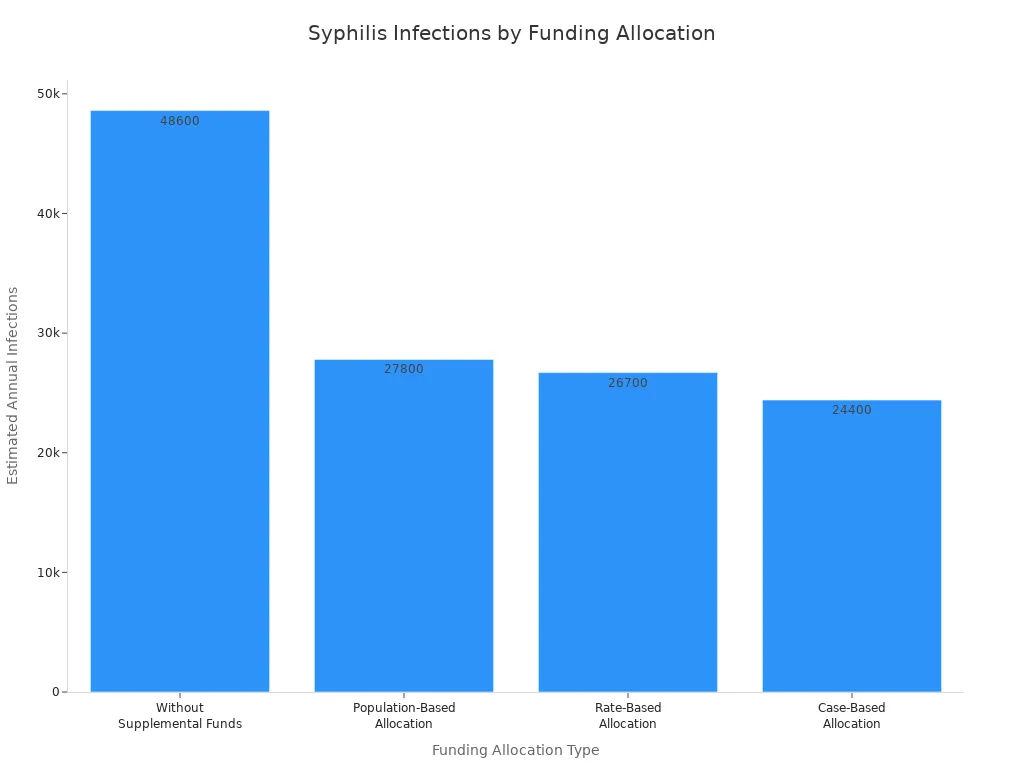News & Events
Treponema Pallidum Antibodies and Syphilis Stats You Should Know

You rely on treponema pallidum antibodies for syphilis diagnosis. Treponemal and non-treponemal tests help you confirm infection and monitor treatment. Early detection and routine screening, especially in prenatal care, save lives.
| Test Type | Purpose | Notes |
|---|---|---|
| Treponemal-specific tests | Confirm syphilis diagnosis | Indicate historical infection |
| EIA for anti-treponemal IgG | Screening | Used for initial screening |
| FTA-abs test | Confirmatory | Can show false positives |
Screening prevents congenital syphilis, which affects 523 babies per 100,000 live births worldwide. Antibody testing protects public health by identifying at-risk people and reducing transmission.
Key Takeaways
- Treponema pallidum antibodies are crucial for diagnosing syphilis. They help confirm infection and monitor treatment.
- Using both treponemal and non-treponemal tests ensures accurate diagnosis. This combination helps track treatment response and prevent reinfection.
- Regular screening, especially for pregnant women, is vital. It reduces the risk of congenital syphilis and improves health outcomes for mothers and babies.
Treponema Pallidum Antibodies in Diagnosis

What Are Treponema Pallidum Antibodies?
When you get infected with syphilis, your immune system reacts by making special proteins called treponema pallidum antibodies. These antibodies target the bacteria Treponema pallidum, which causes syphilis. Your body produces different types of antibodies that recognize various parts of the bacteria. Scientists have found that these antibodies can change depending on the stage of infection and the specific proteins the bacteria show.
Here is a table that shows what researchers have learned about these antibodies:
| Key Findings | Description |
|---|---|
| Antibody Variability | Your body makes different antibodies against several Tpr proteins. |
| Immune Evasion | Treponema pallidum uses Tpr proteins to hide from your immune system. |
| Temporal Patterns | The timing and type of antibody response can vary between people and strains. |
These antibodies help your doctor know if you have syphilis. They also help track how your body responds to infection and treatment.
Role in Syphilis Diagnosis
You rely on treponema pallidum antibodies for accurate syphilis diagnosis. When you get tested, doctors look for these antibodies in your blood. Detecting them is important because it confirms if you have ever had syphilis, even if you do not have symptoms right now.
Treponema pallidum IgM antibodies can stay in your blood for more than three years after treatment for early syphilis. This means that a positive test does not always show a new infection. Sometimes, it shows that you had syphilis in the past or that your body is still reacting after treatment. Doctors use this information to decide if you need more tests or treatment.
Detecting treponema pallidum antibodies is a key part of syphilis diagnosis. These antibodies confirm results from other tests and help doctors decide if you need treatment. Treponemal antibodies can stay positive for many years, so your doctor may use other tests to check if the infection is active.
You will see two main types of serological tests for syphilis:
- Treponemal tests: These tests look for antibodies that target Treponema pallidum. They are very specific and help confirm if you have syphilis. Examples include FTA-ABS and ELISA. Treponemal tests are important for syphilis serodiagnosis and can be used for screening, especially in places where syphilis is rare.
- Non-treponemal tests: These tests look for antibodies that react to substances released by damaged cells, not just the bacteria. They are good for screening and checking your response to treatment. However, they can give false positives if you have other infections or conditions.
Tip: Doctors use both treponemal and non-treponemal tests to make sure your diagnosis is correct. Treponemal tests confirm the infection, while non-treponemal tests help track your response to treatment and check for reinfection.
Here is a quick list of why both types of tests matter:
- Nontreponemal tests detect general antibodies and are useful for screening.
- These tests can miss early or late syphilis and sometimes give false positives.
- Treponemal tests are specific for Treponema pallidum antibodies and confirm the diagnosis.
- Treponemal tests stay positive for years, even after treatment.
Doctors use serologic testing to check for syphilis at different stages. Treponemal tests like ELISA can reach 100% sensitivity and specificity, making them reliable for diagnosis. Non-treponemal tests like VDRL and FTA-ABS also show high accuracy, but each test has its strengths.
You need both types of serological tests for a complete picture. This approach helps your doctor confirm syphilis, monitor your treatment response, and prevent complications. Serological testing is essential for early diagnosis, effective treatment, and stopping the spread of syphilis.
Antibody Tests and Syphilis Diagnosis
Types of Treponema Pallidum Antibody Tests
You have several options when you need to check for syphilis. Laboratories use both treponemal and non-treponemal tests to help you get a clear diagnosis. Each test has a specific role in syphilis diagnosis and treatment.
Here is a table that shows the main types of tests and their features:
| Test Type | Examples | Function | Specificity | Sensitivity |
|---|---|---|---|---|
| Non-Treponemal Tests | VDRL, RPR | Screening and monitoring | Low; false positives | High in active stages |
| Treponemal Tests | FTA-ABS, TP-PA, EIA/CLIA | Confirmation of syphilis infection | High; very specific | High in all stages |
Treponemal tests look for treponema pallidum antibodies that target the bacteria directly. Non-treponemal tests check for antibodies that react to cell damage from syphilis. You use non-treponemal tests for initial screening and to monitor your response to treatment. Treponemal tests confirm the infection and help you with a final diagnosis.
You also need to know which antibodies these tests detect. The table below shows the immunoglobulin classes found in different tests:
| Immunoglobulin Class | Detected in Tests |
|---|---|
| IgG1 | Present in fluorescent treponemal antibody absorption test |
| IgG2 | Present during seronegative primary stage |
| IgG3 | Present in fluorescent treponemal antibody absorption test |
| IgM | Not always detected in standard tests |
Treponemal tests often detect IgG antibodies, which stay in your blood for a long time. Some tests may also pick up IgM, but this is less common.
Interpreting Diagnosis Results
You need to understand how to read your syphilis test results. The results guide your next steps for diagnosis, treatment, and follow-up.
- A negative VDRL test in a healthy person means you do not have antibodies to treponema pallidum. This suggests you do not have syphilis.
- A positive result can sometimes happen even if you do not have syphilis. This is called a biological false positive. You may see this in pregnancy or if you have autoimmune diseases. About 1-2% of people get these false positives.
- If you have HIV, your test results may look different. You need to be careful when interpreting results in these cases.
Tip: Always use both treponemal and non-treponemal tests for a complete diagnosis. This helps you avoid mistakes and ensures you get the right treatment.
You may face some challenges with these tests. Here are common limitations and sources of error:
| Limitation/Source of Error | Description |
|---|---|
| Treponemal Assays in Low-Prevalence Populations | More false positives in areas where syphilis is rare |
| Lack of Standardization | Different test brands may give different results |
| Analytical Sensitivity | Confirmatory tests must be as sensitive as screening tests to avoid errors |
You also need to know about the challenges laboratories face:
- Testing algorithms can be complex.
- There is a risk of false positives.
- You need confirmatory testing to be sure.
- Local syphilis rates and testing volume can affect results.
When you get a positive result, your doctor will look at your history and other health conditions. This helps decide if you need treatment. Treponema pallidum antibody test results play a key role in your clinical care. They help your doctor decide if you need more tests or immediate treatment. Rapid tests have high sensitivity and specificity, which means you can trust the results for quick action.
You use these tests not only for your own health but also to protect others. In prenatal care, serologic testing is vital. Pregnant women get tested to prevent congenital syphilis in babies. Here is how antibody tests help in prenatal screening:
| Evidence Type | Description |
|---|---|
| Maternal Testing | You get tested during pregnancy to check for syphilis before leaving the hospital. |
| Neonatal Evaluation | Babies born to mothers with positive tests get their own serologic tests. |
| Treatment Decisions | Doctors compare your test results with your baby’s to decide on treatment. |
By using treponema pallidum antibodies in serological tests, you help stop the spread of syphilis. Early diagnosis and treatment protect you, your baby, and your community. Regular testing and careful interpretation of results are key steps in syphilis prevention and control.
Syphilis Statistics and Impact

Current Syphilis Trends
You see syphilis rates rising across the globe. In 2021, prevalent cases among women of childbearing age reached 20.48 million, with 5.36 million new cases. Since 1990, the number of syphilis cases increased by nearly 46%. About 60% of countries reported higher incidence and prevalence, with Qatar and Kuwait showing increases over 500%. The highest incidence rate appears in the 20–24 age group, at 467.35 per 100,000. In the United States, syphilis rates climbed sharply. Primary and secondary syphilis cases rose from 2.1 per 100,000 in 2001 to 17.6 per 100,000 in 2021. In 2022, you saw 207,255 total syphilis cases, including 3,755 congenital syphilis cases. Globally, adults aged 15–49 experienced about 8 million new infections in 2022.
Syphilis affects many groups. Men who have sex with men face higher rates. You notice more cases among heterosexual women, especially those of childbearing age. Congenital syphilis cases in newborns link to gaps in maternal care and missed treatment. In 2016, at least one congenital syphilis case appeared in 37 states and Washington DC. Four states—California, Florida, Louisiana, and Texas—reported most cases. Black, Hispanic, and American Indian/Alaskan Native mothers are eight times more likely to be affected than white mothers.
Practical Implications for Diagnosis
You rely on serologic tests and treponemal tests for accurate syphilis diagnosis. Widespread antibody testing, especially point-of-care tests, helps you diagnose syphilis quickly. Rapid tests allow you to start treatment early and improve patient outcomes. You can use these tests at clinics, making them accessible for key populations. Integrating syphilis and HIV testing in clinical settings increases early detection and management.
Routine syphilis screening saves lives and money. Single-visit rapid immunochromatographic strip testing saves about $170,303 per 1,000 women. In resource-poor settings, dual point-of-care tests save $30,000. Scaling up syphilis screening and treatment is cost-effective, especially in high-prevalence areas.
Syphilis statistics guide public health policy. You see that allocating federal STD prevention funds based on disease burden leads to better resource use. Higher funding levels result in lower syphilis rates. A coordinated approach helps you fight the resurgence of syphilis.
| Funding Allocation Type | Estimated Annual Infections |
|---|---|
| Without Supplemental Funds | 48,600 |
| Population-Based Allocation | 27,800 |
| Rate-Based Allocation | 26,700 |
| Case-Based Allocation | 24,400 |

You protect your community by using serological tests, treponemal tests, and routine screening. Early diagnosis and treatment stop the spread of syphilis and reduce complications.
You play a key role in stopping syphilis by using treponemal tests and serological screening.
- Antibody testing confirms infection and guides treatment.
- Early detection with treponemal and non-treponemal tests improves response and prevents complications.
- Regular screening, especially for pregnant women, reduces congenital syphilis and supports better health outcomes.
| Testing Algorithm | Description |
|---|---|
| Traditional | Screen with non-treponemal tests, confirm with treponemal tests. |
| Reverse | Screen with treponemal tests, confirm with non-treponemal tests. |
Stay informed and get tested often. Early diagnosis and treatment protect you and your community.
FAQ
What should you do if your syphilis test is positive?
You should visit your doctor right away. Your doctor will explain your results and help you start treatment to prevent health problems.
Can you get syphilis again after treatment?
Yes, you can get syphilis again. Your body does not build lasting immunity. You should use protection and get regular tests if you are at risk.
How do doctors use syphilis tests during pregnancy?
Doctors use these tests to check for syphilis early in pregnancy. Early detection helps protect both you and your baby from serious health issues.

